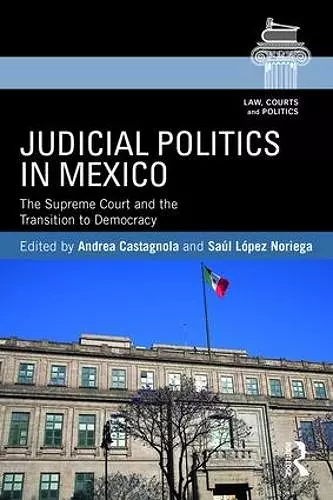Judicial Politics in Mexico
The Supreme Court and the Transition to Democracy
Andrea Castagnola editor Saul Lopez Noriega editor
Format:Paperback
Publisher:Taylor & Francis Ltd
Published:27th Oct '16
Currently unavailable, and unfortunately no date known when it will be back
This paperback is available in another edition too:
- Hardback£160.00(9781138697812)

After more than seventy years of uninterrupted authoritarian government headed by the Partido Revolucionario Institucional (PRI), Mexico formally began the transition to democracy in 2000. Unlike most other new democracies in Latin America, no special Constitutional Court was set up, nor was there any designated bench of the Supreme Court for constitutional adjudication. Instead, the judiciary saw its powers expand incrementally. Under this new context inevitable questions emerged: How have the justices interpreted the constitution? What is the relation of the court with the other political institutions? How much autonomy do justices display in their decisions? Has the court considered the necessary adjustments to face the challenges of democracy?
It has become essential in studying the new role of the Supreme Court to obtain a more accurate and detailed diagnosis of the performances of its justices in this new political environment. Through critical review of relevant debates and using original data sets to empirically analyze the way justices voted on the three main means of constitutional control from 2000 through 2011, leading legal scholars provide a thoughtful and much needed new interpretation of the role the judiciary plays in a country’s transition to democracy
This book is designed for graduate courses in law and courts, judicial politics, comparative judicial politics, Latin American institutions, and transitions to democracy. This book will equip scholars and students with the knowledge required to understand the importance of the independence of the judiciary in the transition to democracy.
"This book extends the boundaries of our understanding of the evolving role of the Court in the political evolution in Mexico from 1917 to the more recent process of democratization in this country. Throughout all of the authors’ contributions, this work is a fine-grained analysis that permits us to understand the institutional changes in the Supreme Court and in its relations to other socio-political actors. Employing a wide collection of methodologies and theoretical approaches, the authors contribute in a remarkable way to elucidate not only the Mexican case but also the role of the courts in the dynamics of democratization from a comparative perspective. Indeed, this book is an exciting new contribution for scholars of Mexico and for other interested in the field of comparative judicial politics. To be sure, this edited book will be a useful toolkit for lawyers and political scientists, and for professors and students."
Rodolfo Sarsfield, Universidad Autónoma de Querétaro
"What role does the Mexican Supreme Court play in democratization? This collection answers this question by examine mechanisms by which the court has become empowered and activated throughout the consolidation phrase as well as the court’s decision-making logic and impact on Mexican democracy. It combines qualitative and quantitative analysis, novel data collections, and a host of perspectives into fresh insights on this emblematic case. The result is a compelling analysis that makes a theoretical contribution with practical implications for institutional design."
Ryan Carlin, Georgia State University
"… opens important avenues for future comparative research."
Latin American Research Review
ISBN: 9781138697829
Dimensions: unknown
Weight: 249g
176 pages